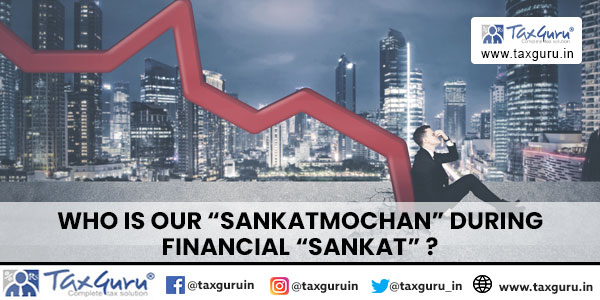CA Lalit Munoyat
 Strictures passed and fines levied by the ITAT Mumbai against AO & CIT for filing a frivolous appeal : ITO vs. Growel Energy Co. Ltd (ITAT Mumbai) 17-06-2014
Strictures passed and fines levied by the ITAT Mumbai against AO & CIT for filing a frivolous appeal : ITO vs. Growel Energy Co. Ltd (ITAT Mumbai) 17-06-2014
This short discussion is being initiated against the backdrop of the above judgment.
Under various taxing statutes discretionary power vests in a functionary like Income Tax Officer, Dy. Commissioner of Income Tax, Commissioner, Income tax , Service tax and central excise adjudicators and the like in case of customs laws and such other taxation law. Such powers are expected to be exercised reasonably and in good faith following the principles of natural justice. It is by now well settled that whenever such a power is conferred, the functionary cannot lake a stand that it is his absolute discretion to exercise the power or not to exercise the same. When such a power is exercised on a wrong or with an oblique motive or for a collateral purpose or without reference to the call of the principles of rules of reason and justice then such functionary end up with conclusions which are arbitrary, vague and fanciful and depicting more of personal whims than a reasoned reasoning, then court of law step in to control the discretion if exercised capriciously or in bad faith. Restricting this short discussion to Income Tax Issues, it is found from the grapevine and the reports of the assessees that some of the taxing authorities, both administrative and appellate, are prone to exercise the discretion against the above principles which lead to many avoidable litigations consuming the precious time of the Judiciary. Discretionary power ,as such, can’t be done-away-with totally nor does this short discussion aims at suggesting the same but suggests some room to prevent its misuse. In addition to various remedies available to prevent its misuse one more remedy containing the “Stick & Carrot” theory may also be used fruitfully.
According to the grapevine may assessees are faced with some hostile officers who not only do not listen to their views and written explanations but also show a sort of arrogance and pass some unreasoned and non-speaking orders and challenging the assessees to look for appellate remedies knowing it fully well that nothing would happen to him if such order is back fired at the appellate stage.
A thought may be given to the creation of a “System of Credits”. Under such a system each officer should be allowed some number of credits for each order of enhanced assessment which survive the scrutiny of the last fact finding authority i.e. ITAT. Comparative more credits may be allowed for each enhanced assessment involving the question of law which survive the scrutiny of the Court of law i.e. High Court and the Supreme Court.
Conversely , if an enhanced assessment does not survive the factual scrutiny by the ITAT then equal number of negative credits should be deducted from his account. Moreover comparative lesser credits should be deducted for each enhanced assessment involving the question of law which does not survive the scrutiny of the Court of law i.e. High Court and the Supreme Court justifiability appreciating the fact that the level of legal knowledge expected at the lower level and at the Judiciary level can’t be the same.
An alternative theory may also be developed which provides for graded credits at each level of survival of the enhanced assessment or graded negative credits for each level of failure of the enhanced assessment say , for example, higher positive credits for each level of survival and higher negative credits for each level of failure of the enhanced assessment.
The system of credit should be applicable to each departmental authority, original or appellate.
At the end of a suitable block of period say 3 or 5 years, the total available credit may be used for a suitable reward, either monetary or by way of promotional or transfer posting. Negative accumulated credits may be allowed to be set off against future positive credits wherever possible and if not so possible, then be used as a tool for extracting better exercise of discretionary power and with continuing failure, with monetary deductions.
Needless to say, the reward for the accumulated credit should be at par with the expectation of a functionary for exercising discretion with an oblique motive or for a collateral purpose.
Last but not the least this discussion , in no way, aims at undermining the reputation and goodwill of the upright functionaries who not only, always exercise their discretionary powers most reasonably and in good faith but also ensure that such powers appear to have been so exercised without any motive for reward or fear of failure.
This article , in no way, suggests replacement of an ideal ethical establishment wherein every person is supposed to possess, carry and exercise best standards of ethics in carrying out his legal obligations without any ulterior or personal object to be achieved.
Compiled by: CA LALIT MUNOYAT, B.Com.(Hons.),CS,FCA, DISA, @ munoyat@gmail.com # 98201 93508
Click here to Read Other Articles of CA Lalit Munoyat























CIT vs. Larsen and Toubro Ltd (Bombay High Court) JULY 10, 2014.
Frivolous appeals by dept results in harassment to assessee & wastage of judicial time. Dept to pay costs of Rs. 1 Lakh. Costs may be recovered from, disciplinary action taken against, concerned official
(i) We are surprised if not shocked that such appeals are being brought before us and precious judicial time is being wasted that too by the Revenue. The least and minimum that is expected from the Revenue officers is to accept and abide by the Tribunal’s findings in such matters and when they are based on settled principles of law. If they are not deviating from such principles and are not perverse but consistent with the material on record, then, we do not find justification for filing of such appeals. We have found that merely expressing displeasure orally is not serving any purpose;
(iv) It would be open for the superior/competent authority to recover the costs personally from the officer responsible and equally take disciplinary action against him if the power to decide about filing such appeals is abused or the decision making authority is utilized to harass innocent Assessees.
Pursuant to the severe strictures passed by the Courts in CIT vs. Sairang Developers (Bom High Court) and ITO vs. Growel Energy Co. Ltd (ITAT Mumbai) regarding the mindless manner in which appeals are filed by the department, without regard to the harassment caused to the taxpayers, the CBDT has issued an Office Memorandum dated 17.07.2014 by which a Committee to study the appellate orders to examine the filing of appeals by the department has been set up. The Committee comprises of six high-level officers and they have been given clear and detailed terms of reference. The object of the Committee is to appraise the efficacy of existing dispute resolution forums of CsIT (A) &ITAT and to suggest steps to reduce litigation before these forums. The Committee is expected to submit its report within 8 weeks from the date of its constitution.
Dear Sirji,
With due respect to all, Hon. Court, Hon. Judges , Hon Justices and Advocates, I submit that for last more than 25 years I have been passed through all stages . Having knowledge of law , the orders had been passed through silently and very bad strictures on me. No proof, evidence , documents on record. Advocates represented and written , ignoring the records on file and also without seeing the files!!!
What we can expect ,? I have all proof of documents!!! I can prove on record against my Judgments . No exceptions. !!!!! Who take on Record of Such Advocates and !!!!! Are there any authority to take in to account and peep in to , EXCEPT FILING AN APPEAL AND APPEALS and more spending of money !!!!
I would say the strictures given in the above case is appropriate to give a sight to the other side.
I fully agree with you Sudarshana. However as I have already mentioned this one is meant for those who work with an oblique motive or for a collateral purpose
The article has interesting and creative suggestions for dealing with the problem of injustice wilfully meted out by adjudicating officials.
In response to the comment of ‘S. Sudarshana’, it may be observed that while bona fide differences in opinion are unavoidable, and there may be more than one ‘correct’ positions on an issue, the sad truth is that most of the so-called ‘speaking orders’ do not speak with adequate reasoning to reveal the legal position of the author. Mostly he has no legal position but only a convenient administrative one. The first report of the Tax Administration Reforms Commission has taken note of this.
Discretionary powers and discriminatory judgements are un-avoidable. Even in the highest court of justice, we find division of judgement by a bench. Some are let off by one set of bench while another set says ‘hang him’. Majority will rule.
The need to give speaking orders, as they say, has solved the problem to a great extent.